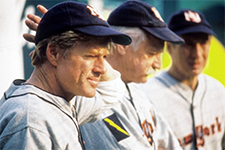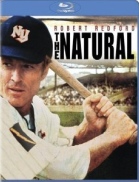The Natural [Blu-Ray]
|
 The Natural arrived in movie theaters during the fabled re-election year of Ronald Reagan's "Morning in America," and the film couldn't have been better timed to take advantage of the American culture's newfound yearning for nostalgia and hero worship. Deeply old-fashioned in virtually every sense of the word, it is a man's melodramatic sports weepie on par with Knute Rockne All American (1940), a throwback not only to a different period in American history, but a different form of cinema that was one of the highpoints of the classical era but was all but run out of town with the irony and cynicism that fueled the new waves of the '60s and '70s. Unabashedly sentimental and grand in its themes of goodness, honor, tenacity, and forgiveness, The Natural is a grand emotional experience if you give yourself over to its portrait of youthful giftedness run aground on the rocky shores of temptation and then resurrected as middle-age mythic-heroism.
The Natural arrived in movie theaters during the fabled re-election year of Ronald Reagan's "Morning in America," and the film couldn't have been better timed to take advantage of the American culture's newfound yearning for nostalgia and hero worship. Deeply old-fashioned in virtually every sense of the word, it is a man's melodramatic sports weepie on par with Knute Rockne All American (1940), a throwback not only to a different period in American history, but a different form of cinema that was one of the highpoints of the classical era but was all but run out of town with the irony and cynicism that fueled the new waves of the '60s and '70s. Unabashedly sentimental and grand in its themes of goodness, honor, tenacity, and forgiveness, The Natural is a grand emotional experience if you give yourself over to its portrait of youthful giftedness run aground on the rocky shores of temptation and then resurrected as middle-age mythic-heroism.
The film's golden (and golden-haired) hero is Roy Hobbs, not so much played as embodied by Robert Redford in his first role in four years (during the off time he won an Oscar for directing 1980's Ordinary People and developed the Sundance Institute). Preternaturally gifted at playing baseball, we see Roy in the 1920s as a young boy whose deep-rooted gifts are nurtured by his devoted father amidst the pastoral beauty of a purposefully ambiguous pre-Depression Midwestern farm community (Caleb Deschanel's lovingly sun-dappled cinematography is never so effective as when he's visually merging baseball and wheat fields). The idyllic nature of Roy's childhood is rocked by the death of his father, followed by a bolt of lightning that destroys the tree under which he died, which Roy uses as the raw material from which he carves his own baseball bat, lovingly rendered as a tribute to his fallen paterfamilias and emblazoned with the burn carving of a lightning bolt and the fabled words "Wonder Boy." As a young man in his early 20s, Roy leaves his childhood sweetheart Iris (Glenn Close) behind and heads off to Chicago to try out for the major leagues. In mythic terms (a lens through which the film constantly begs us to view it), this is the beginning of Roy's heroic journey, although it is destined for tragedy, first as a result of his encounters with characters who come to embody the corruption that strangles the purity of the game--a manipulative sports writer named Max Mercy (Robert Duvall) and an egotistical star player nicknamed The Whammer (Joe Don Baker) who is clearly modeled on Babe Ruth--and then by a black-clad femme fatale named Harriet Bird (Barbara Hershey) who ironically sets her maniacal sights on Roy the afternoon that he strikes the Whammer out on three pitch balls, the moment that should all but ensure his grand future but instead seals his temporary doom. Roy's encounter with Harriet leaves him emotionally and physically scarred, a silver bullet rattling around in his guts for a stretch of 16 years that take place off-screen before he returns to the game and is recruited to the dismal New York Knights, a fictional last-place ball club managed by the cantankerous Pop Fisher (Wilford Brimley) and his coach Red Blow (Richard Farnsworth), who look like they could be thick and thin versions of the same person, but ultimately prove to have sharply etched and distinctive personalities: Pop is all grump and bluster and Red is plain spoken and down-to-earth, quietly keeping all the deck chairs on the Knights' sinking Titanic in good order. Again we find corruption, now embodied by the Judge (Robert Prosky), the Knights' malevolent co-owner who spends his time plotting and scheming in his darkened office with Gus Sands (Darin McGavin), a powerful bookie (Max Mercy is also still crawling around, although it takes him a while to place Roy). Both men have a vested interest in the Knights' constant failure, something that Roy, now a tarnished golden boy quietly seeking his redemption, upsets via the simple virtue of his natural gifts and his deep, abiding love of the game itself. Of course, temptation still slinks about, and Gus unleashes the platinum blonde seductress Memo Paris (Kim Basinger) on Roy to misdirect his energies and sideline his skills on the field. Directed by Barry Levinson as his sophomore effort following Diner (1982), The Natural was based on the praised 1952 novel by Bernard Malamud, but it fundamentally changes the story's meaning by discarding the original's bitter conclusion in failure and replacing it with a grandiose climatic victory that finds Roy stepping up to bat with virtually everything on the line (including possibly his own life) and not just knocking it out of the park, but turning his long-delayed moment of redemption into a virtual fireworks display. Not surprisingly, then, one of the chief criticisms of the film, which was leveled by more than a few critics when it was first released, was that it is too hagiographic, especially in light of Malamud's dark novel. Many critics felt that the film was simplistic in its lionization of Roy Hobbs and, by extension, the star Robert Redford. Thus, the film's operatic climax, in which Hobbs slams out a last-minute home run that knocks out the stadium lights and turns his base rounding into a slow-motion journey backlit by a raining storm of sparks scored to Randy Newman's now iconic score, was seen as an overinflated, indulgent act of hero worship. The problem with this critique is twofold. First, it misses the underlying darkness of the film's story. Notice I did not say "pessimism," for it is possible to acknowledge tragedy without succumbing to it. Roy's story is ultimately one of wasted opportunity; however good he is as a "middle-age rookie," he can never fully account for the 16 years he lost as a result of giving in to temptation, which he very nearly does again. Far from being unproblematically lionized, Roy is presented as a deeply flawed character who makes multiple mistakes, but it always striving to do right (in this regard, he very much earns his frequent comparisons to the mythic figures of Odysseus and King Arthur). "Some mistakes I guess we never stop paying for," he tells Iris at one point, neatly summarizing the film's overall approach to good and evil. Many of the criticisms of the film also ignore a fundamental narrative strand, which is Roy's desire to win not so much for his own sake, but for the sake of the team and, more importantly, saving it for Pop, who gave his heart to the game, only to have it trampled on, as Red puts it so eloquently. "I'm not going to let you take this team from Pop," Roy angrily tells the judge, which makes it clear that he is risking his life on the baseball diamond not to ensure his own glory, but to justify and reward Pop's dedication to the game he loves so much. This is why the shot of Pop looking out from the dugout after Roy's home run with the shower of sparks reflected in his glasses is the most emotionally stirring moment of that sequence. Roy's redemption via baseball glory is not just about him, but rather about Pop and all that he represents. Thus, Roy's earlier, youthful, and self-centered desire to be seen as "the best there ever was" is replaced by a mature, selfless desire to use his gifts not for his own glory, but to help someone else. It is yet another means by which the film celebrates and reifies the genuine (Roy and Pop's love of the game) and punishes the manipulative (the Judge and Gus's desire to make money off America's pastime). It's all utterly shameless. And wonderful.
Copyright ©2010 James Kendrick Thoughts? E-mail James Kendrick All images copyright © Sony Pictures Home Entertainment | |||||||||||||||||||||||||||||||||||
Overall Rating:



 (3.5)
(3.5)
Subscribe and Follow
Get a daily dose of Africa Leader news through our daily email, its complimentary and keeps you fully up to date with world and business news as well.
News RELEASES
Publish news of your business, community or sports group, personnel appointments, major event and more by submitting a news release to Africa Leader.
More Information
